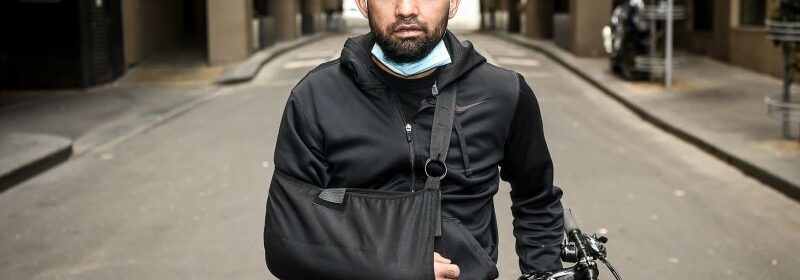Indigenous cyclist settles police brutality case after bodycam footage emerges

Save articles for later
Add articles to your saved list and come back to them any time.
An Aboriginal man has settled a legal case over alleged police brutality after the emergence of body-worn camera footage that appears to support claims he was assaulted during an arrest in Southbank in September 2020.
Korey Penny, 34, claimed in court documents that officers dragged him off his bicycle, tackled him to the ground and called him a “black c—” after he failed to use a bike light while riding to work at the Metro Tunnel building site.
Korey Penny has settled his case with Victoria Police after he was arrested while riding to work on St Kilda Road in 2020.Credit: Justin McManus
At the time of the arrest, a Victoria Police spokeswoman defended the force’s response, saying “we are satisfied with the use of force in relation to this incident”, while claiming the officers’ bodycams had not been turned on because of the “dynamic nature” of the incident.
However, Penny’s lawyers eventually obtained body-worn camera footage from other officers who witnessed the arrest and discussed it afterwards. The footage was referred to by Penny’s barrister Merys Williams during a directions hearing in the Supreme Court on February 23.
“Recent discovery of body-worn camera footage, which records a conversation contemporaneous with the events subject of the pleadings, and really, in essence, goes to the heart of the liability dispute, which is the nature of the physical contact made with police,” Williams told the Supreme Court on February 23.
“The body-worn camera footage depicts a conversation between police officers who witnessed the incident, and they used words, like: ‘The member just clubbed him and literally ripped him off the bike.’ And so, in our submission, that could go to aggravating exemplary damages.”
The force reached an undisclosed financial settlement with Penny and his legal team just days before the case was due to go to trial in March.
Penny said he continued to suffer from an elbow injury sustained during the arrest, which he says has further eroded his faith in police. He told this masthead that he had been targeted by police on other occasions in his home state of Western Australia.
“I live with this every day, it’s a common thing for me. I was on my way to work and bang, I was out cold,” Penny said.
He claims he was singled out by police because of his race, which was denied by police.
Korey Penny, pictured in 2020 with his damaged bike.Credit: Justin McManus
According to court documents, Penny asked the arresting officers: “‘You always do this to Aboriginal people?’ I told them, ‘I’m from WA,’ and they said, ‘You’re not in WA now, you black c—’.”
Penny’s solicitor, Estelle Petrie from Robinson Gill Lawyers, said all officers should be compelled to activate body-worn cameras, and face consequences if they fail to comply.
“Korey was riding his bike on his way to work, when he was spear-tackled to the ground. There is just no way that this is a proportionate use of force and yet, in the absence of direct footage of the incident, police continue to argue ‘there’s nothing to see here’,” Petrie said.
She said the case, and the force’s failure to take serious disciplinary action against the officers involved, demonstrated the need for an independent Police Ombudsman in Victoria.
Victoria Police did not respond to questions from this masthead, but released a statement.
“A complaint was made to IBAC and as a result, a Victoria Police officer received workplace guidance due to the body-worn camera not being activated,” the statement said. “Penny was not targeted due to his Aboriginality. Victoria Police is not in a position to make further comment at this stage.”
Penny’s arrest occurred on September 3, 2020, in the midst of Melbourne’s second lockdown.
A report released last week by Inner Melbourne Community Legal found Aboriginal or Torres Strait Islander people received 2.5 per cent of all COVID-related fines issued by police enforcing public health orders in 2020, yet make up only 1 per cent of the state’s population.
The report also revealed Indigenous people accounted for more than 30 per cent of COVID fines in some regional Victorian towns such as Mildura, while almost 20 per cent of all fines issued by the officers from Collingwood police station were to First Nations peoples.
Last week, a Victoria Police spokeswoman emphatically denied any racial profiling, and insisted that officers had been “routinely reminded to take a consistent approach” to enforcement action during the lockdowns.
The Morning Edition newsletter is our guide to the day’s most important and interesting stories, analysis and insights. Sign up here.
Most Viewed in National
From our partners
Source: Read Full Article

